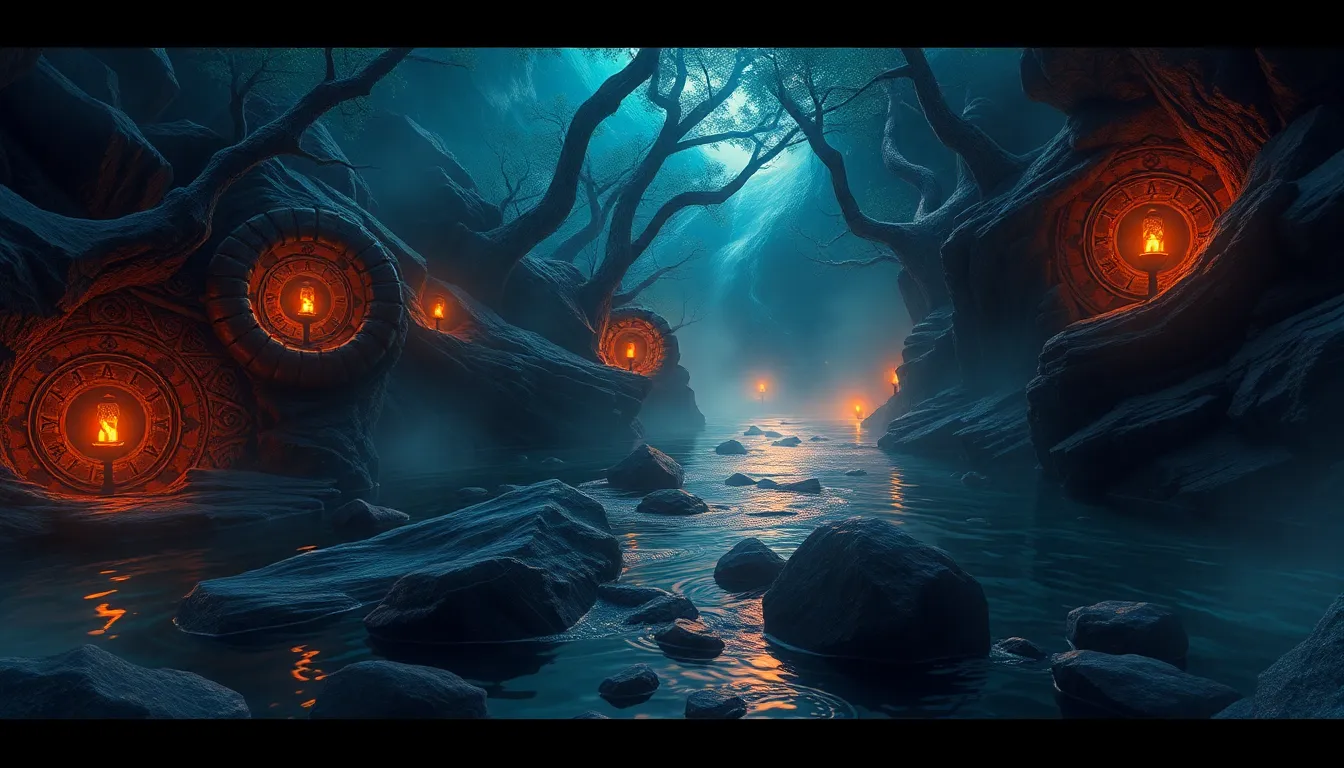The River of the Wise: Myths of Knowledge Seekers
Introduction: The Allure of Knowledge
Knowledge seekers are individuals who pursue wisdom and understanding, driven by an insatiable curiosity about the world. This pursuit has been a central theme in various cultures, often embodied in myths and stories that illustrate the journey toward enlightenment. Myths serve as a bridge between the past and present, offering insights into human nature, morality, and the quest for truth. In this context, the metaphor of the “River of the Wise” emerges, symbolizing the continuous flow of knowledge and the transformative journey of those who seek it.
The Concept of the River in Mythology
Throughout history, rivers have been powerful symbols in mythology, often representing the flow of wisdom and life itself. Different cultures have utilized rivers in their narratives to convey deeper meanings about knowledge and experience. Some key aspects of rivers as symbols of wisdom include:
- Flow of Knowledge: Rivers are often seen as conduits of information, carrying insights from one generation to the next.
- Life and Renewal: Just as rivers nourish the land, the pursuit of knowledge is a source of spiritual and intellectual sustenance.
- Journey and Discovery: The winding path of a river mirrors the often complex and non-linear journey of a knowledge seeker.
One notable example is the River Lethe from Greek mythology, known as the River of Forgetfulness. Souls who drank from its waters would forget their earthly lives before reincarnation, emphasizing the duality of knowledge and oblivion. Similarly, the River of Forgetfulness illustrates the notion that knowledge is not only about what is remembered but also about what is willingly forgotten.
The Journey of the Knowledge Seeker
The archetype of the knowledge seeker is prevalent in mythology and literature, representing the universal quest for understanding. This journey is often fraught with challenges and obstacles that the seeker must overcome. Comparing the journeys of various figures highlights common themes in the pursuit of wisdom:
- Odysseus: In Homer’s “Odyssey,” Odysseus embarks on a long and arduous journey filled with trials that ultimately lead him to greater self-awareness and understanding.
- Siddhartha Gautama: The founder of Buddhism, Siddhartha’s quest for enlightenment involves renouncing worldly pleasures and enduring great hardships, ultimately leading to profound insights.
These narratives illustrate that the journey of the knowledge seeker is not merely about the acquisition of facts but also about personal growth and transformation.
Myths of Transformation: Crossing the River
In many myths, crossing a river signifies a transformation or rite of passage. This act often symbolizes the overcoming of challenges to gain knowledge and wisdom. Such crossings can represent the transition from ignorance to enlightenment. Notable examples include:
- Gilgamesh: In the “Epic of Gilgamesh,” the hero must cross dangerous waters to seek eternal life, symbolizing the struggle against mortality and the pursuit of deeper understanding.
- The Crossing of the River Styx: In Greek mythology, crossing this river signifies the transition from life to the afterlife, highlighting the importance of knowledge in shaping one’s fate.
These myths illustrate that the act of crossing a river is not just a physical journey but a metaphorical passage into a new realm of understanding.
Guardians of Knowledge: Mythical Entities and Guides
Throughout mythology, various entities serve as guardians or guides for knowledge seekers. These figures often pose challenges that must be faced to attain wisdom. Some significant guardians include:
- The Sphinx: In Greek mythology, the Sphinx poses riddles to travelers, challenging them to demonstrate their knowledge and insight.
- Charon: The ferryman of the dead, Charon guides souls across the River Styx, embodying the transition from knowledge of the living to the mysteries of the afterlife.
- Ancient Sages: Figures like Laozi and Confucius provide wisdom and guidance to seekers, emphasizing the role of mentorship in the pursuit of knowledge.
These guardians highlight the importance of facing challenges and seeking guidance in the journey of self-discovery and wisdom acquisition.
The Duality of Knowledge: Wisdom vs. Ignorance
Many myths depict the consequences of knowledge and ignorance, illustrating the fine line between wisdom and hubris. The pursuit of knowledge can lead to enlightenment, but it can also result in downfall if not handled wisely. A prime example is the myth of Prometheus, who defied the gods by bringing fire (symbolizing knowledge) to humanity. His act of enlightenment led to severe punishment, showcasing the risks associated with knowledge.
This duality underscores that while knowledge can empower, it can also corrupt if pursued for selfish ends or without responsibility. Understanding this balance is crucial for modern knowledge seekers.
Cultural Variations: Knowledge Myths Around the World
Knowledge myths vary significantly across cultures, reflecting the diverse ways societies personify wisdom. A comparative analysis reveals fascinating insights:
- Native American Traditions: Many tribes emphasize the importance of nature and ancestral wisdom, often personifying knowledge in animal guides.
- Asian Myths: In cultures like Hinduism and Buddhism, knowledge is often seen as a path to liberation, with deities embodying wisdom.
- African Folklore: Stories often highlight the significance of community knowledge and oral traditions in preserving wisdom across generations.
These cultural variations illustrate that knowledge is a universal theme, yet it is expressed uniquely in each society’s myths and stories.
Modern Interpretations of Ancient Myths
The relevance of ancient myths continues in contemporary society, inspiring modern literature and media. Many authors and filmmakers draw on these timeless narratives to explore the journey of knowledge seekers. Some notable examples include:
- Films: Movies like “The Matrix” and “Inception” explore themes of knowledge, reality, and personal transformation.
- Books: Contemporary literature often revisits mythological themes, such as “The Alchemist” by Paulo Coelho, which echoes the journey of self-discovery.
- Art: Visual artists draw on mythological symbols to convey the complexities of knowledge and the human experience.
These interpretations demonstrate that the quest for knowledge remains relevant, resonating with audiences across generations.
Lessons from the River: Wisdom for Today’s Seekers
As we navigate our own rivers of knowledge, there are practical takeaways from mythological insights that can guide modern seekers:
- Embrace the Journey: Understand that the pursuit of knowledge is a lifelong journey filled with challenges and growth.
- Seek Mentorship: Find guides or mentors who can provide wisdom and support along the way.
- Balance Knowledge with Humility: Recognize the power of knowledge while remaining humble and aware of its potential consequences.
By reflecting on these lessons, today’s knowledge seekers can navigate their paths with greater insight and purpose, drawing inspiration from the timeless myths that have shaped human understanding.



